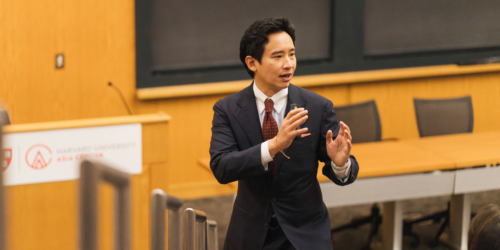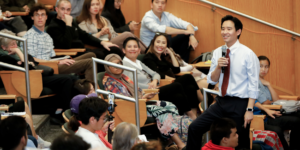Feature
After a 13-year hiatus, alumnus Pita Limjaroenrat returns to Harvard Kennedy School — this time “as a coach, not a player.”
Limjaroenrat shares lessons learned from his time in public service.

When Pita Limjaroenrat graduated from Harvard Kennedy School in 2011, he didn’t anticipate the political maelstrom awaiting him back home as a rookie politician in Thailand. Just eight months into his political career, Limjaroenrat stood out as the sole member of the Future Forward Party — then Thailand’s most prominent political party — who escaped a political ban imposed on the party’s entire leadership. When Thailand’s constitutional court forced the party to dissolve, Limjaroenrat assumed a leadership role in its successor, the Move Forward Party.
For three years, he served as the face of the party, ultimately running for prime minister and winning the election by 14 million votes. However, he was prevented from taking office when the Move Forward Party faced the same fate as its predecessor and a number of parties that came before it: the government disbanded it. Limjaroenrat cites the party’s platform, which advocated for increased democratic measures — including reforming the country’s lèse-majesté law, a section of the country’s criminal code, which punishes those who speak ill of the monarchy — as the reason for its dissolution.
While he hasn’t called for abolishing the lèse-majesté law, Limjaroenrat maintains that reform is necessary. “The key concern is creating some proportionality around the crime and the penalty,” he explains. “We were trying to amend this law around the proportionality of it. Once it’s proportionate, it should be there in Thailand. The country still needs protection for the head of state, but at the same time, we also need greater freedom of speech.”
Though removed from power by the country’s political elite, Limjaroenrat was elected to office by the masses. At a time when the effects of democracy’s erosion are reverberating worldwide, voter turnout for the Move Forward Party reached unprecedented levels. “For us last year, the voting turnout was 76%. That’s my proudest achievement; [my party] managed to make sure that politics was trustworthy enough and meaningful enough for the Thai people to go vote,” Limjaroenrat says.
He credits much of the Move Forward Party’s success in building trust with Thai citizens to his grassroots fundraising strategy, where the average donation never exceeded $15. The decentralized nature of his party’s campaign finance strategy showed the public that the party valued their concerns above special interests. His approach to funding the campaign, along with other tactics that helped his party amass such a large majority of votes, were lessons Limjaroenrat learned as a student at the Kennedy School. “Political empowerment was key to our campaign’s success … while very powerful, it needs a lot of organization and a lot of time and a lot of patience. If we keep doing this, I think it will allow us to be trustworthy,” he says. “It gives trust as our competitive advantage compared to any other political party. A lot of all these things I learned from the Kennedy School.”

Having returned to the Kennedy School this year as a Rajawali Fellow , Limjaroenrat is ready to help HKS students develop a new blueprint to fight against global democratic backsliding. He explains, “If this trend continues globally, the voting turnout will be lower and lower, like what we’ve been seeing, [and] that’s when we give it to the autocrats. For us, on the small ‘d’ democracy side, we need a new playbook, and we need to refresh our thinking of how we can overcome this issue of getting people to go out and vote as much as possible.” Limjaroenrat hopes to leverage his unique position as both a Kennedy School alum and a leading democracy activist from Southeast Asia to inspire his students. Drawing from his lived experiences, he envisions creating a practical guide for students so that “if they want to run for office, their dreams are a success.”
In addition to sharing his own experiences in government with students, Limjaroenrat has embraced the fellowship’s extensive learning opportunities. “I also want to upgrade myself,” he explains. “I want to learn about AI and democracy. I want to learn about climate change. I want to learn about urban risk. I want to learn about the Harvard Humanitarian Initiative. All these things that I saw firsthand — all the problems, the flash flood, the chronic flood, the forest fire, the aging society — [these are all] things that I saw in Thailand when I was a member of Parliament, but I did not have any solutions.”
Though he has been banned from Thai politics for 10 years, Limjaroenrat plans to build on his past experiences in Thailand at Harvard to run for office again, driven by the hope and passion for Thailand’s younger generation: “My daughter is 8 years old right now, so in 10 years, she’ll vote for the first time, and she said she’ll vote for daddy.”
